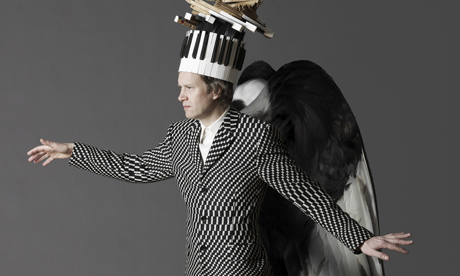Django Bates – review

- Django Bates Photo: © Nick White 2010
The BBC’s Jez Nelson introduced Anglo-Danish pianist Django Bates’ trio at the Vortex as one the most eagerly anticipated gigs of the year. This outing was the first in a UK series playing material from his newly released Belovèd Bird album- a homage to the legendary bop saxophonist Charlie Parker. Bates was joined by two young Scandinavian musicians: Peter Bruun on drums and Petter Eldh on bass.
They opened with a focussed rendition of Parker’s Moose the Mooche, with Eldh’s cycling figure mirroring Bate’s left hand bass line. From this grounding the pianist released flurries of notes gradually developing into progressively wide-ranging solos. Throughout the next few pieces- the second his own, the third Parker’s Billie’s Bounce- Bates continued this, seeking to release the tension accrued by such static bass figure repetition with releases of delicate notes building into ever prestidigious cacophonies. Bates is a compelling improviser and- much like in his compositions- is never afraid to move well beyond jazz clichés or even the idiom itself. Such spontaneity was reinforced by his assertion- after the third piece, whilst describing the format of the gig- that “a life planned is a life endured”. In typical Bates style however, after a statement that might invoke the wildest heights of group improvisation, the trio then moved into the pianist’s own melancholic Sadness All the Way Down, a beautifully slow, uncluttered piece with the emphasis well on space.
Following this there was a return to brasher, louder dynamics with Bates releasing frenzied lines over the top of the rhythm section. It was at this stage that something hinted at the outset became fully apparent: the balance was slightly awry for such agile music. Bruun’s drums- mic’ed seemingly to emphasise his impressive cymbal work- lacked any low end, whilst Eldh’s double bass boomed so much it eclipsed all bass drum hits. This hole in the midrange frequencies rendered the rhythm section too turgid when the bass was active and too light and ungrounded when the drums took the fore. Together this meant that Bates kept leaving them for dust with his solos.
The way he suddenly exploded into these- together with the way they were unabashedly nonconformist– conjured the idea of a jack-in-a-box, with a mass of pent up energy suddenly released by an individual with fixed eyes and an inane grin happily flaunting his eccentricity. This image was not hindered by Bates’ multicoloured fez. Such periodical springing to life outside the rhythm section’s turgor left Bates somewhat exposed however, and it was also not hard to imagine him waving about on a spring, unsupported by sonic ballast. It was indeed interesting to see Bates in the context a trio. In his usual big band outings there is more dense orchestration and texture for him to hide behind; here he was comparatively naked. But this made him no less compelling, and whatever heights were reached in the first half of the set, proved to be a valid portent for the second.
Any initial deficiencies in the balance were soon made up for by the band really playing in sympathy. Pieces began gradually being distilled into progressively tight codas, and interplay in the between solos was born out with more confidence. This culminated in a scintillating section with drums, bass and piano all degenerating into an incredibly tight (and heavy) almost free-noise unison, then flipping back to down-the-line playing, then back to the noise, and so forth until a syncopated and perfectly synchronised conclusion. As in the first set, Bates then inverted the dynamics, choosing to sing a simple plangent descending line into a microphone, once again emphasising space over matter. Then a repeating figure high on the bass heralded more hell-for-leather improvising leaving the feeling that no stone was being left unturned. Finally following riotous applause, came an encore with a number by old Bates foil Iain Bellamy.
Overall, this gig was a rare opportunity to see Django perform in the context of a smaller band. In the second half at least, the two musicians he chose to accompany him proved they were easily up to the task, despite any misgivings over the balance. The BBC’s Jazz on 3 will be played highlights from the gig on Monday 26 April. Tune in. Also, check the Vortex’s lineup over coming months for other ingenious musicians.
Future dates:
Thursday 5 August 2010
Django Bates Beloved Bird
Ronnie Scott’s Jazz Club
47 Frith Street
Westminster, London W1D 4HT
Box office 020 7439 0747
Friday 6 August 2010
Django Bates Beloved Bird
Snape Prom
Snape Maltings Concert Hall
Aldeburgh
Suffolk
BOX OFFICE Tel. 01728 687110
